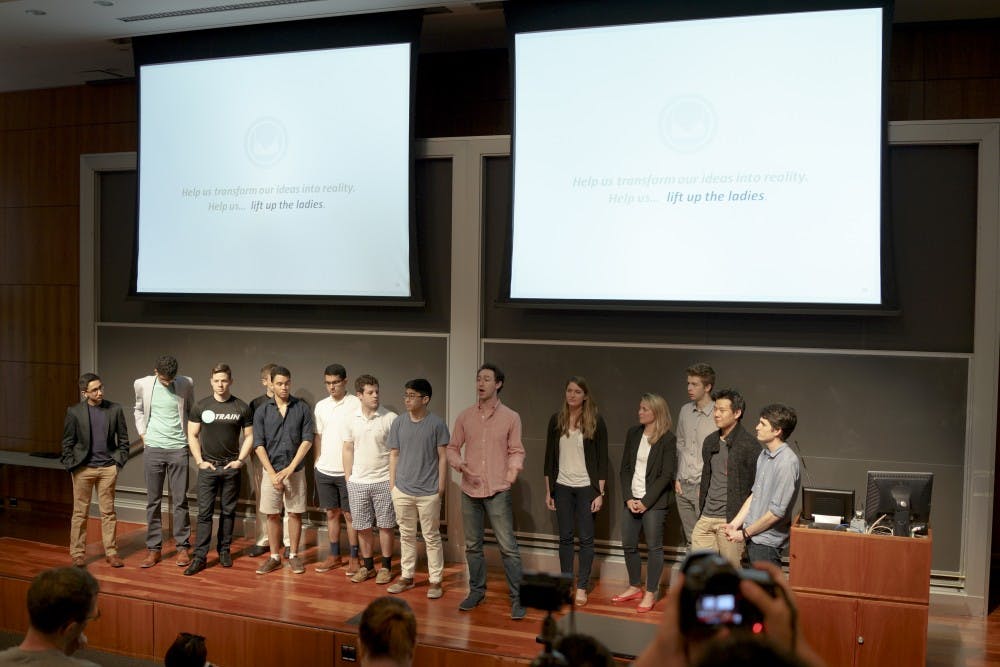
Demo Days is one of WeissLabs’ largest entrepreneurship events of the year, where several startup companies such as Emery & Elizabeth presented pitches for feedback. | Courtesy of Duong Nguyen
In the midst of a growing startup culture in Philadelphia, WeissLabs of the Weiss Tech House hosted Demo Days, one of its largest entrepreneurship events of the year.
On April 22, dozens of guests had the opportunity to watch seven startup companies present their pitches in front of a panel of venture capitalists for feedback. These judges included co-founder at Horizons School of Technology Ed Lando, and Wharton graduate and managing director at MentorTech Ventures Brett Topche.
The Demo Day was the capstone of a ten-week entrepreneurship course at WeissLabs — Penn’s new startup incubator — offered to selected applicants from Penn who want to develop their ideas into companies. The day was an opportunity for these students to receive professional feedback on the startups they have spent the past few months developing.
Wharton seniors and WeissLabs co-founders Guthrie Gintzler and Ernest Tavares came up with the idea for WeissLabs after attending the 2015 Pennvention competition, where students develop a video, and pitch their ideas to investors for prize money.
“We wanted to make some kind of incubator where we don’t just give people resources, but we actually bring them together,” Gintzler said . “We’ve gone from what Penn does, which is giving a man a fish by giving people money, to teaching them how to fish, by teaching how reach to investors and raise money to build a business.”
Each startup was given ten minutes to present their pitch followed by a seven minute question and answer session with the judges. The first team to present was WeTrain, an on-demand personal training service. Co-founder Zachary Hertzel highlighted the multifaceted screening process for finding trainers: the company conducts background checks and interviews, and receives additional feedback on trainers via the app, through which customers are able to rate trainers and leave comments.
Startups were aimed at different sectors such as food with Crescent Bites, financial technology with Slice Capital and Factor Place, and fashion with Patos. One startup, Emery & Elizabeth, aims to prevent the hassle of purchasing a bra by providing an affordable online shopping experience alongside the convenience of a home try-on service.
“Buying bras is overwhelming because there are over 300 options when you walk in a store,” Wharton MBA and co-founder Jenna Kerner said. “We want to offer three to five core styles of everyday bras and simplify that experience for them.”
Afterwards, the startups had the opportunity to demonstrate their products. Turing showcased a prototype of its product, Root, a low cost wall plug attachment that allows users to control electricity flow remotely from an app to save money on their electric bill.
Wharton sophomore and Root co-founder Michael Raevsky stressed the usefulness of removing the responsibility of remembering to turn off electrical appliances.
“For example, if I go to school and forget to turn my TV off, I’ll get a notification twenty minutes later reminding me to turn my TV off. If you shave one hour of TV usage per day in such a way, you get 12 dollars in energy savings over a course of a year.”
The Daily Pennsylvanian is an independent, student-run newspaper. Please consider making a donation to support the coverage that shapes the University. Your generosity ensures a future of strong journalism at Penn.
DonatePlease note All comments are eligible for publication in The Daily Pennsylvanian.




